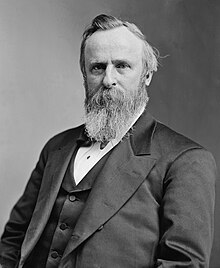📖 Presidential Profile
Comprehensive overview of leadership, policies, and historical significance
📋 Biography & Political Journey
Early Life and Military Service
Rutherford Birchard Hayes was born on October 4, 1822, in Delaware, Ohio, to Rutherford Hayes Sr. and Sophia Birchard Hayes. His father died before his birth, leaving his mother to raise him with the help of his uncle Sardis Birchard. Hayes graduated from Kenyon College in 1842 and Harvard Law School in 1845, establishing a successful law practice in Cincinnati. During the Civil War, he served with distinction in the Union Army, rising to the rank of brevet major general and suffering multiple wounds in battle.
Hayes entered politics as a Republican, serving in the U.S. House of Representatives from 1865 to 1867 and as Governor of Ohio for three non-consecutive terms (1868-1872, 1876-1877). His gubernatorial tenure was marked by progressive reforms including prison reform, education improvements, and support for African American rights. His reputation for honesty and reform made him an attractive presidential candidate for Republicans seeking to distance themselves from the corruption scandals of the Grant administration.
The presidential election of 1876 between Hayes and Democrat Samuel Tilden became one of the most controversial in American history. Tilden won the popular vote by over 250,000 votes, but disputed electoral votes in Florida, Louisiana, South Carolina, and Oregon left the outcome uncertain. A special Electoral Commission was created to resolve the crisis, ultimately awarding all disputed votes to Hayes, giving him a 185-184 electoral victory in what became known as the Compromise of 1877.
Controversial Decisions and Policies
Hayes’ presidency was immediately controversial due to the circumstances of his election, earning him the nickname “His Fraudulency” from critics who believed the election was stolen. His most consequential and controversial decision was the withdrawal of federal troops from the South, effectively ending Reconstruction. This decision was part of the Compromise of 1877, which secured his presidency but abandoned newly freed slaves to the mercy of Southern Democrats, leading to decades of Jim Crow laws and systematic disenfranchisement. Critics argued that Hayes betrayed the principles of the Republican Party and the sacrifices made during the Civil War.
The White House Easter Egg Roll
One of the most enduring and charming legacies of the Hayes presidency was the establishment of the White House Easter Egg Roll in 1878. When Congress banned children from rolling eggs on the Capitol grounds due to damage to the landscaping, Hayes’ wife Lucy invited them to use the White House South Lawn instead. “Let them come and roll eggs on our lawn,” Hayes reportedly said, creating a tradition that continues to this day. The first official White House Easter Egg Roll drew hundreds of children and their families, with Hayes himself greeting visitors and watching the festivities from the White House portico.
Humor & Jokes
His Fraudulency
Hayes was called 'His Fraudulency' because of the disputed election. It's like being nicknamed 'Cheater'…
Read More →Greatest Wins
💰 Resumption of Specie Payments and Economic Stabilization
Hayes successfully restored the gold standard, strengthening America's currency and establishing long-term economic stability after…
Read More →Epic Fails
⚖️ The Compromise of 1877: Ending Reconstruction
Hayes ended Reconstruction by withdrawing federal troops from the South, abandoning millions of freed slaves…
Read More →